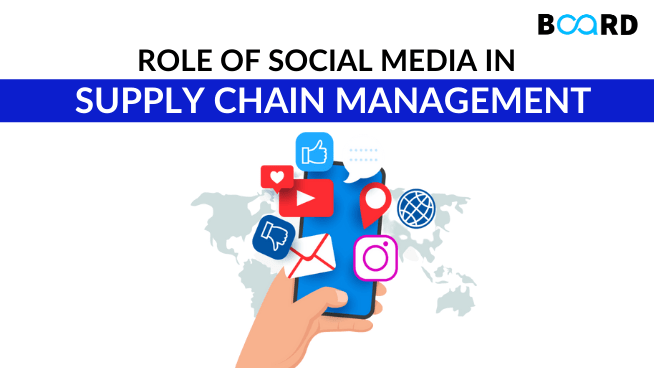Essential Tools and Strategies for Social Media Marketing
Role of Social Media in Supply Chain Management

There once was a time when companies were adding policies that discouraged their employees from using social media while on the job. Over the course of the last few years, this notion had taken a turn for the opposite. Instead of shying away from social media, now companies are embracing the platform as a way for their company to expand their reach online and tap into new revenue sources. In many cases, social media from employees can act as additional brand awareness building implementations.

It seems that over time the logistics arena has been able to work past their initial doubts and really embrace the idea of social media as a whole. A recent study that was conducted by IDG Research Services stated that 57% of all those that responded to the survey stating that they did not use social media in their supply chain, they would be open to the idea of using it if it became available to them.
Although widespread adoption of using social media in the supply chain would never be immediate, expecting a slow adoption over time seems to be the safe bet, given recent surveys among professionals within the industry. Social media could potentially completely shift the processes of the industry. As of now, supply chain management professionals are watching what is happening within social media and preparing themselves as best as they can for upcoming changes.
1. Early Adopters
Early adopters have the early lead. Although a vast majority of people reference only the most popular social networks — Facebook, Twitter and LinkedIn when thinking of social media, the true social media experience is much larger for companies. They can engage users through smartphone applications, RFID, IoT, Big Data, business social media (for sharing information between partner groups) in order to help information spread much more quickly.
Many companies use social media implementations, accessible by only their own employees. For instance, Home Depot use their own social media sharing website, The Warehouse, to help quickly move information between management and ensure that they have a quick and efficient way to reach those that need to be in the know as quickly as possible.
Many other large businesses use social media in their supply chain management processes. These companies are on the cutting edge of the supply chain management industry. Social media is inevitably going to play an important role in the future — across all different types of media. From the 140-character text messages of Twitter to .mp3 uploads on Soundcloud, companies have more ways of engaging employees and clients than ever before.
Today’s marketplace is highly competitive and it’s critical for companies to think of innovative new ways to streamline their operations, increase efficiencies, and optimize productivity in order to stay ahead of the competition.
Using modern technologies, such as social media, can improve your organization’s supply chain management. It can create more visibility, improve communication, increase control, and reduce operational and labor costs. When you have a more efficient and stable supply chain, you can enhance your customer satisfaction. The ripple effect of using social media to improve your supply chain management can expand outwardly across virtually your entire organization, which is great for business.
2. How Can Social Media Be Used in the Supply Chain?
Social Media is about building relationships, and it can be used in a supply chain to build and grow relationships among trading partners. Information and knowledge gathered from the use of social media by supply chain partners can provide insight into various issues of the supply chain, industry, competition, etc. It can also be used to build relationships and determine key performance indicators, such as the on-time performance of a carrier or slow payments from a shipper. Some companies use social media to solicit information from their customers as a platform for making recommendations for improvement.

Social Media allows supply chain participants to monitor supply chain events and transactions to keep everyone up-to-date with current situations, such as a delay in shipping or a carrier failed to pick up a shipment. Twitter messages can indicate the arrival or departure of a shipment from a particular warehouse. Twitter can be used to communicate the need for shipments of a particular type or to alert drivers to accidents and road closures. Social media can provide companies with more timely and insightful information about risks and events, enabling them to take corrective action sooner and thus minimizing the impact of a supply chain disruption.
Social media can be an invaluable tool for supply chain professionals looking to identify new innovations, understand commodity and pricing trends, capture best practices, and collaborate with stakeholders, peers, and suppliers. It can improve existing processes, mitigate risk, and increase efficiencies. By tapping the collective insights and knowledge of supply chain participants, businesses can drive innovation within their supply chains, which leads to continuous improvement and business growth.
You can expect more companies to adopt social media processes in the future. Supply chain management is all about finding the most efficient way to deliver information. Social media inevitably helps with the distribution of important information and continues to be a prominent and effective way for companies to quickly disseminate that information. Businesses that ignore social media forgo these opportunities and miss out on potential business development opportunities.
If you are considering the implementation of social media in your own supply chain management processes, it is important that you understand the benefits that could be utilized but also consider the implications it could have on current processes.
Written by — Ranjan Sinha, Board Infinity Coach
About the coach —
Coach Ranjan Sinha is strategic leader of multi-cultural experience in spearheading entire strategic business operations such as shipping, logistics, supply chain planning & port operations across India, UAE, Qatar, Oman & Eastern Europe with key contributions in providing advisory & consultancy in optimizing & rationalizing manufacturing processes & supply chain networks, driving productivity, cost reduction, internal process & customer service improvement projects in collaboration with key decision makers.
Board Infinity is a full-stack career platform for students and job seekers enabled by personalized learning paths, career coaches and access to opportunities. Be a Career Coach, join as a Student
